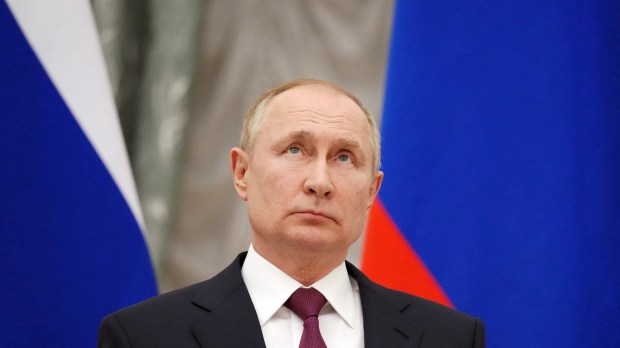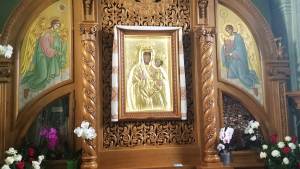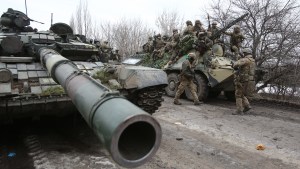Myroslav Marynovych is the author of The Universe Behind Barbed Wire, an account of his struggles as a Ukrainian dissident under Soviet rule in the 1970s and 1980s. He spent seven years in prison for his involvement in the Ukrainian Helsinki human rights group.
Now, from his perch as vice rector for mission of the Ukrainian Catholic University in Lviv, in Western Ukraine, he looks at Russia’s invasion of Ukraine as both something that was predictable and as a warning to the West. If the West does not stand up to Vladimir Putin’s aggression, the Russian president will be emboldened to make further moves in Eastern Europe, he says.
For Marynovych, the West has been much too timid in its response to Putin. President Biden announced a new round of sanctions Thursday, which do not involve removing Russia from the global banking system known as SWIFT. Marynovch criticized leaders who believe that cutting Russia out of SWIFT is too strong a move.
Marynovych spoke with Aleteia at the end of the first day of Russia’s invasion of Ukraine. By Thursday evening, there had not been any attacks in or near Lviv, but he said that the university has already instructed staff and students about where to take shelter in case of attack.
How are you, and what is the situation like in Lviv?
Well, of course, we’ve been watching TV and following the internet news. We see that thanks to the lethal weapons we received from the United Kingdom just in the last days, our soldiers were able to stop the Russian troops on their way to Kharkiv, in the East. So it was just proved how important it was that the West finally decided to help Ukraine with lethal weapons.
I was suffering when there was a period of appeasement, of cajoling an aggressor. Ukraine appealed, because we know the Russian logic. We know Putin’s attitude. All attempts of the West to go into a compromise, to find a solution, meant that the West is weak. … So Putin decided that “Oh, the West is afraid of us. We are the biggest.” and he said that publicly. “Now we are the biggest and the strongest country in the world.”
And his allusion to nuclear weapons also maybe was intended to have that effect on the West: “Don’t even think about escalating this.”
Yes. After 2014, we said that [the war in Donbas] is not [simply] a Ukrainian crisis. Because Russia pretended to not be part of the conflict [the People’s Republics of Luhansk and Donetsk were declared by “Ukrainian separatists”]: “It’s an internal Ukrainian conflict.” For many politicians in the West, that was acceptable. It was useful to suggest that. Otherwise, they would have to declare that Russia was an aggressor. So they prefer to be in political correctness mode.
But now you see that Russia was a part of this conflict and is now, openly.
What is the mood like at the Ukrainian Catholic University?
We moved lectures to Zoom again, as it was during the pandemic, because many students who do not live in Lviv want to be at home. But I imagine that nobody – students or professors – is willing to speak about their subjects, because we are all preoccupied with this news. And students probably discuss with their professors their fears, thoughts and ideas.
But we decided that we want our students to be busy with something, so we appealed to them to be volunteers. For example, Lviv will see I don’t know how many trains with refugees from the Eastern part of Ukraine. Today, we are trying to find places at the university and the whole city to find a place for people to sleep.
We also appealed to students to become blood donors
Is there a fear that the university could be a target?
We are ready for that. At least, we specified some places to hide, for all members of our community. Because we do not believe Putin that Russia wants to hit only military sites. This is the first stage of the war. But then, in order to increase panic, they will occasionally, “unwillingly” hit residential, civilian areas.
What is Putin’s motivation in all this?
Well, today, all of Ukraine has been speaking about Putin as if he is totally crazy – a madman. We knew about his presupposition that Ukraine is not a nation, that this is part of Russia, and Russia has to take Ukraine back. This is rooted very deeply in Russian mentality. I would say that the fact that our history, our culture was just stolen by Russia. In the 17th century, Russia accepted the territory of the former Kyivan Rus and started to count its history not from the creation of the Moscow tsardom, or kingdom [in the 16th century], but from the creation of Kyivan Rus [in the 9th century]. Now, when Russia is without Ukraine, as one Russian observer, Lilia Shevtsova, said, Russia is not Russia. Because Russia means that Rus is within its territory, but now it is just Muscovy.
So it’s a long historical controversy, and Putin understands that.
Then, there is a huge demographic crisis in Russia, because so many people are just drunk every day. It’s a huge problem for Russia.
Then, China is quietly occupying Russia. A lot of territories in Russia’s Far East are Russian officially, but Chinese are a majority in these territories. So, many Russians move from the Far East to the European part. So for Putin, not to have Ukraine means not to be European, to be cut from Europe. So only having Ukraine as a place to move all these people, this is a very important solution. I read about this plan even at the beginning of the 1990s, when the Soviet Union collapsed. At the time, there was a huge conversation and fear in Russia: “Well, we want to have Ukraine as a place to accommodate our people from the Far East.”
So you can see there’s a combination of different arguments why Putin wants Ukraine to surrender.
I’m afraid that very soon, when they conquer some small territories in Ukraine, they will announce that a new Ukrainian government that is on good terms with Russia will ask for negotiations with Russia and surrender. This was the intelligence I read about the plans to announce the creation of the new fraternal government of Ukraine in contrast to the “fascist, Nazi” government they say we now have.
How would you answer Putin’s “presupposition” that Ukraine has to be part of the Russian sphere, that it’s impossible for it to be an independent nation?
For us it is very natural for Ukrainians to respect freedom. We’ve had a difficult 30 years of independence — various weaknesses, corruption, and so on – but what was very obvious is freedom – and freedom is a red color for a bull. Because Russia cannot be built on freedom. It’s just the opposite. So Ukraine is very dangerous for the Russian ideology that a nation belonging to eastern Slavic region might be free and might exercise a different and more successful rule than in Russia. The comparison is very dangerous for Russia.
How will the current crisis affect the Church?
There is an almost unanimous position of all the Churches and religions in Ukraine in favor of Ukrainian independence and against the invasion. Even the head of the Ukrainian Orthodox Church of the Moscow Patriarchate appealed to Putin to stop the invasion. We have excellent relations with Muslims – Crimean Tatars — and excellent relations with Jews. All people want freedom.
How would regime change, if Putin gets his way, affect the Church?
It would be a disaster if Russia reestablishes its total control over Ukraine – for the Church and the whole of society. Russia has a list of the most dangerous people to be eliminated, to be killed. As a former political prisoner, I do not need to read such news. I know perfectly well that Russia would have such a list of such people.
So it would be total terror.
Would that list include leaders of the Church?
Absolutely. You have to deal with a government, with a leadership that can lie without any limits. So they pretend that they find an enormous collection of arms in the headquarters of the Greek Catholic Church. And of course, this is punishable.
You had eight years of Russian lies. … You cannot find the golden mean between the truth and lies. You have to say “You are lying.” But remember, at the beginning [of the Maidan protests of 2013-2014], the world was not sure “Is the Maidan a revolution of dignity? Maybe there are fascists. Maybe there are nationalists there.”
I remember that the [Russia-friendly president Viktor] Yanokovich regime organized two attacks on Jews in Kyiv during the first days of Maidan, to present Maidan as anti-Semitic. And Maidan organized guards for all Jewish places, in order not to allow this provocation.
This talk about a Russian hit list is reminiscent of what happened when the Soviets retook Ukraine in 1945. Some of the first people to be imprisoned or executed were Greek Catholic bishops. Then a KGB-orchestrated Church council made the Church illegal.
Yes. But it reminds me of an even earlier time – the [Nazi] occupation of the Sudetendland, the occupation of Austria. This is the logic of Putin. It’s equal to the logic of Hitler. The same need for revenge, in the sense of punishing the West for humiliation during the collapse of the Soviet Union, compared with the humiliation of Germany by the Treaty of Versailles, and Hitler’s reaction.
What do you worry about the most about this crisis?
I heard from my German friend that the dominant feeling of many Germans is, “Well, we hope that Putin will stop at the Polish border.” There is a presupposition that “Okay, Ukraine was always part of Russia. We have to give up” – of course, not very openly, but “Nobody in the West declare war against Russia. And if Russia occupies Ukraine, Russia will stop near the Polish border.”
My response to that is, “You are wrong,” because when Russia occupies Ukraine and takes total control over it, Putin will decide he is the most powerful leader in the world. Then he will repeat what he’s already said: “Poland, the former socialist republics, this is our territory. Move all NATO arms away from there.” It’s unbelievable that Western politicians cannot understand this logic of Putin. And they create safe images, safe plans, but then they ruin it. For example, we Ukrainians appealed to the West when [French President Emmanuel] Macron and [German Chancellor Olaf] Scholz said, “Oh no, we have to negotiate with Russia.” They did that. Were they successful? Macron was humiliated when he went to see Putin. Nobody met him at the airport. And the West still is persisting in its theory that there is a possible golden mean between Russia and the West.
Now, I am afraid the West decides, “Okay, we cannot save Ukraine, but we will make an agreement with Russia that Russia will stop there.” This is the same as during Munich. Russia will never stop. It would be an enormous mistake.
Do you think the U.S. should send troops into Ukraine?
No, I didn’t mean sending troops. What was wrong is cajoling the aggressor. In order to prevent war, the West makes it closer. The irrational fear of nuclear weapons encourages Russia to blackmail the West and be even more uncontrolled.



